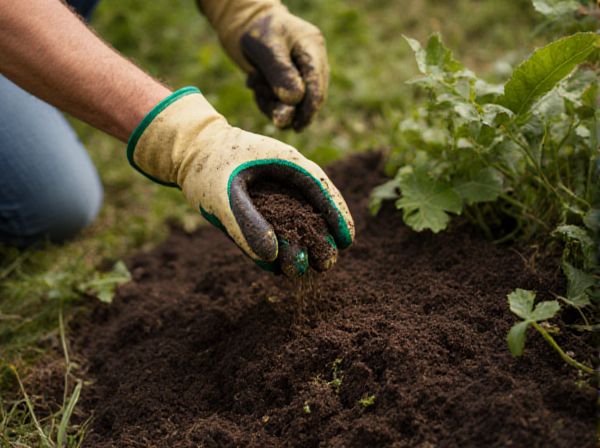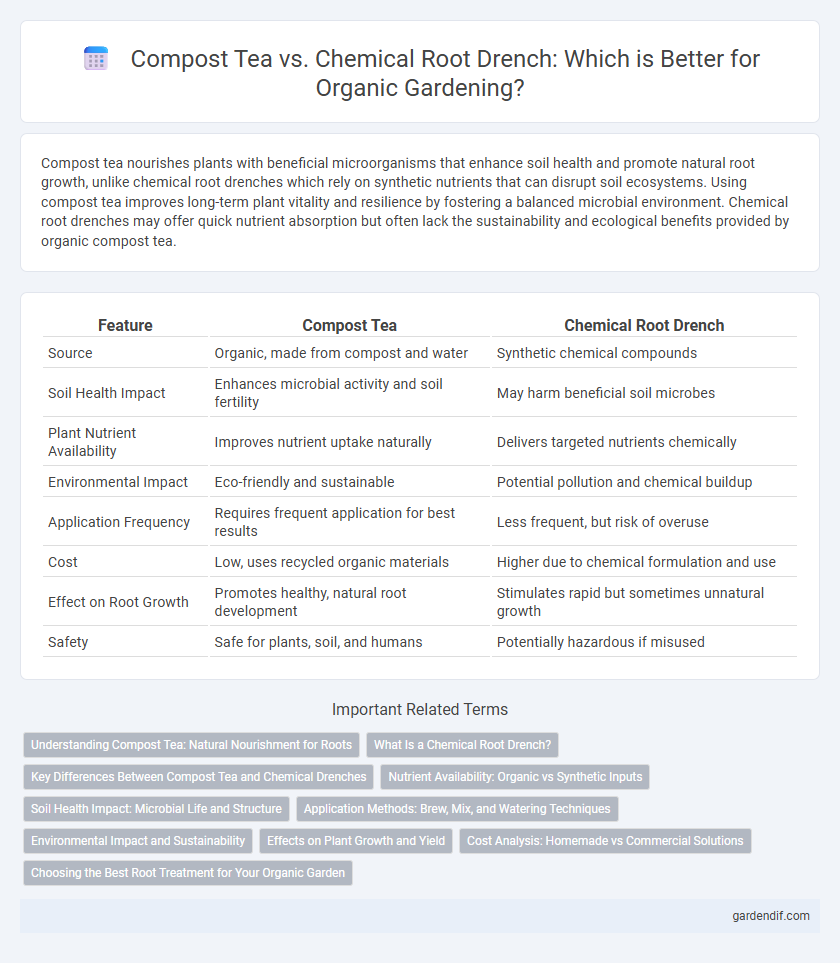
Compost tea vs Chemical root drench Illustration
Compost tea nourishes plants with beneficial microorganisms that enhance soil health and promote natural root growth, unlike chemical root drenches which rely on synthetic nutrients that can disrupt soil ecosystems. Using compost tea improves long-term plant vitality and resilience by fostering a balanced microbial environment. Chemical root drenches may offer quick nutrient absorption but often lack the sustainability and ecological benefits provided by organic compost tea.
Table of Comparison
| Feature | Compost Tea | Chemical Root Drench |
|---|---|---|
| Source | Organic, made from compost and water | Synthetic chemical compounds |
| Soil Health Impact | Enhances microbial activity and soil fertility | May harm beneficial soil microbes |
| Plant Nutrient Availability | Improves nutrient uptake naturally | Delivers targeted nutrients chemically |
| Environmental Impact | Eco-friendly and sustainable | Potential pollution and chemical buildup |
| Application Frequency | Requires frequent application for best results | Less frequent, but risk of overuse |
| Cost | Low, uses recycled organic materials | Higher due to chemical formulation and use |
| Effect on Root Growth | Promotes healthy, natural root development | Stimulates rapid but sometimes unnatural growth |
| Safety | Safe for plants, soil, and humans | Potentially hazardous if misused |
Understanding Compost Tea: Natural Nourishment for Roots
Compost tea is a nutrient-rich, organic liquid produced by steeping compost in water, delivering beneficial microorganisms and essential nutrients directly to plant roots. This natural nourishment enhances soil microbial activity, improves root growth, and increases plant resilience against diseases without the harmful chemicals found in traditional chemical root drenches. Unlike synthetic treatments, compost tea promotes sustainable gardening by fostering a balanced soil ecosystem that supports long-term plant health and productivity.
What Is a Chemical Root Drench?
A chemical root drench involves applying synthetic nutrient solutions or pesticides directly to the soil around plant roots to promote growth or combat pests. These concentrated chemicals are designed for rapid absorption by the root system, targeting specific deficiencies or infestations. Unlike organic methods, chemical root drenches can lead to soil imbalance and potential long-term harm to beneficial microorganisms.
Key Differences Between Compost Tea and Chemical Drenches
Compost tea enhances soil biology by introducing beneficial microbes that improve nutrient availability and plant health, whereas chemical root drenches rely on synthetic compounds to target specific pests or diseases. The natural microbial activity in compost tea supports sustainable soil ecosystems, contrasting with chemical drenches that may disrupt soil microbiota and contribute to chemical buildup. Compost tea often promotes long-term soil fertility, while chemical drenches provide immediate, targeted pest control but with potential environmental risks.
Nutrient Availability: Organic vs Synthetic Inputs
Compost tea enhances nutrient availability by supplying a diverse array of beneficial microbes that improve soil structure and nutrient uptake, promoting sustainable plant growth. Chemical root drenches provide immediate nutrient delivery with synthetic fertilizers, but they often lack the microbial diversity essential for long-term soil health. Organic inputs support nutrient cycling and bioavailability, whereas synthetic inputs may lead to nutrient imbalances and decreased soil vitality over time.
Soil Health Impact: Microbial Life and Structure
Compost tea enhances soil health by promoting a diverse and active microbial population that improves nutrient cycling and soil structure. Chemical root drenches often disrupt microbial communities, reducing beneficial organisms that support plant growth and soil aeration. The use of compost tea supports long-term soil vitality by fostering a balanced ecosystem crucial for sustainable agriculture.
Application Methods: Brew, Mix, and Watering Techniques
Compost tea involves brewing a nutrient-rich, oxygenated solution by steeping organic matter to promote beneficial microbial life, then applying it through foliar sprays or soil drenches for improved root health. Chemical root drenches consist of synthetic nutrient solutions mixed directly with water and applied to the soil around plant roots for targeted nutrient uptake. Effective watering techniques for compost tea require maintaining aeration and regular application to sustain microbial activity, while chemical drenches demand precise concentration and timing to prevent nutrient burn.
Environmental Impact and Sustainability
Compost tea enhances soil microbiome diversity and promotes plant health without introducing harmful chemicals, significantly reducing environmental pollution and supporting sustainable agricultural practices. Chemical root drenches, often containing synthetic pesticides and fertilizers, can lead to soil degradation, water contamination, and harm to beneficial organisms, undermining long-term ecosystem balance. Choosing compost tea as a root treatment aligns with eco-friendly farming goals by improving nutrient cycling and minimizing negative environmental footprints.
Effects on Plant Growth and Yield
Compost tea enhances plant growth and yield by improving nutrient availability and promoting beneficial microbial activity in the soil, which strengthens root systems and increases resilience to pests and diseases. In contrast, chemical root drenches provide targeted nutrient delivery but may disrupt soil microbiome balance and lead to long-term dependency or soil degradation. Studies show compost tea-treated plants exhibit higher biomass and better fruit quality compared to those treated solely with chemical drenches.
Cost Analysis: Homemade vs Commercial Solutions
Homemade compost tea typically costs significantly less than commercial chemical root drenches, relying on everyday organic materials such as compost, water, and aerators, which reduces expenses to under $5 per batch. Commercial chemical root drenches average between $20 to $50 per application, factoring in the price of synthetic chemicals and specialized delivery systems. Evaluating long-term use, homemade compost tea offers sustainable budget benefits by minimizing chemical inputs and promoting soil health, potentially lowering overall plant care costs.
Choosing the Best Root Treatment for Your Organic Garden
Compost tea enriches soil biology by introducing beneficial microbes that enhance nutrient uptake and improve root health naturally. Chemical root drenches deliver targeted nutrients or pesticides but may disrupt microbial balance and harm soil ecology in organic gardens. Selecting compost tea supports sustainable growth and aligns with organic gardening principles for healthier, more resilient plants.
Compost tea vs Chemical root drench Infographic

 gardendif.com
gardendif.com